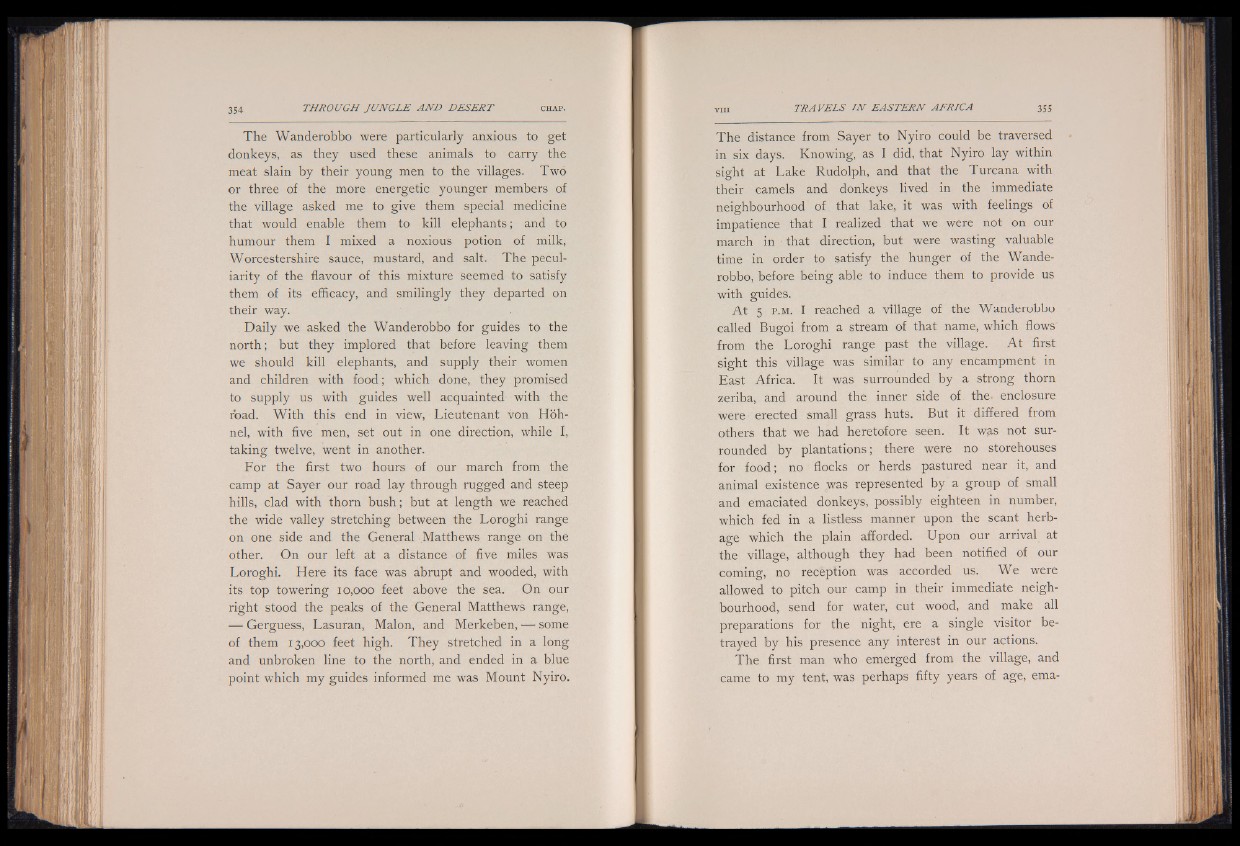
The Wanderobbo were particularly anxious to get
donkeys, as they used these animals to carry the
meat slain by their young men to the villages. Two
or three of the more energetic younger members of
the village asked me to give them special medicine
that would enable them to kill elephants; and to
humour them I mixed a noxious potion of milk,
Worcestershire sauce, mustard, and salt. The peculiarity
of the flavour of this mixture seemed to satisfy
them of its efficacy, and smilingly they departed on
their way.
Daily we asked the Wanderobbo for guides to the
north; but they implored that before leaving them
we should kill elephants, and supply their women
and children with food; which done, they promised
to supply us with guides well acquainted with the
road. With this end in view, Lieutenant von Hoh-
nel, with five men, set out in one direction, while I,
taking twelve, went in another.
For the first two hours of our march from the
camp at Sayer our road lay through rugged and steep
hills, clad with thorn bush; but at length we reached
the wide valley stretching between the Loroghi range
on one side and the General Matthews range on the
other. On our left at a distance of five miles was
Loroghi. Here its face was abrupt and wooded, with
its top towering 10,000 feet above the sea. On our
right stood the peaks of the General Matthews range,
— Gerguess, Lasuran, Malon, and Merkeben, — some
of them 13,000 feet high. They stretched in a long
and unbroken line to the north, and ended in a blue
point which my guides informed me was Mount Nyiro.
The distance from Sayer to Nyiro could be traversed
in six days. Knowing, as I did, that Nyiro lay within
sight at Lake Rudolph, and that the Turcana with
their camels and donkeys lived in the immediate
neighbourhood of that lake, it was with feelings of
impatience that I realized that we were not on our
march in that direction, but were wasting valuable
time in order to satisfy the hunger of the Wanderobbo,
before being able to induce them to provide us
with guides.
A t 5 p . m . I reached a village of the Wanderobbo
called Bugoi from a stream of that name, which flows
from the Loroghi range past the village. A t first
sight this village was similar to any encampment in
East Africa. It was surrounded by a strong thorn
zeriba, and around the inner side of the. enclosure
were erected small grass huts. But it differed from
others that we had heretofore seen. It was not surrounded
by plantations; there were no storehouses
for food; no flocks or herds pastured near it, and
animal existence was represented by a group of small
and emaciated donkeys, possibly eighteen in number,
which fed in a listless manner upon the scant herbage
which the plain afforded. Upon our arrival at
the village, although they had been notified of our
coming, no reception was accorded us. We were
allowed to pitch our camp in their immediate neighbourhood,
send for water, cut wood, and make all
preparations for the night, ere a single visitor betrayed
by his presence any interest in our actions.
The first man who emerged from the village, and
came to my tent, was perhaps fifty years of age, ema